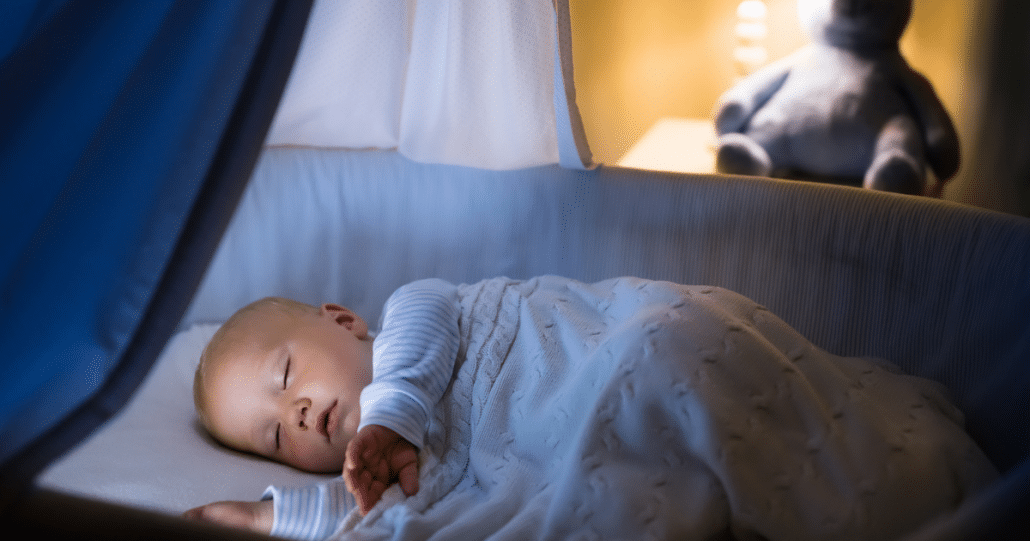Are you a new parent struggling to get your baby to sleep? We have all been there.
Welcoming a new family member is a joyous occasion, but let’s face it, putting them to sleep is a different task altogether.
As a new parent, you often get accustomed to countless sleepless nights, but we will try to change that in this guide.
This article will explore some simple yet effective tips and techniques to help your baby sleep peacefully.
We’ve got you covered, from establishing a bedtime routine to creating a cozy sleep environment.
1. Creating a Perfect Sleep Environment
A cozy, warm, and comfortable sleep environment is crucial for helping your baby to fall asleep faster.
First, start by gently dimming the lights as soon as evening approaches and the sun starts to set.
Soft, subtle lighting can create a calming atmosphere, preparing them for a restful night.
Second, invest in a cozy crib mattress to make the sleeping space inviting.
You should also maintain a comfortable room temperature by dressing your baby in breathable pajamas because this helps regulate their body temperature.
It would be best to consider introducing a nightlight to provide a gentle and warmer glow.
The light should have warm tones and not be too bright for the room.
At last, having a warm and soft comforter goes a long way.
Ensure they are tucked in properly to sleep comfortably through the night without feeling cold.
2. Establishing a Consistent Bedtime Routine
A consistent bedtime routine will train your child’s mind and body and signal them to sleep.
To start with a routine, consider sleeping with your baby at the same time each day.
In the evening, give your kids a warm bath, making them comfortable and calm.
Also, avoid their bluescreen exposure from mobiles, laptops, games, etc, for a peaceful sleep.
You can try light physical activities with your kid to tire them out. This will help immensely in getting a good night’s sleep quickly.
In building a bedtime routine, consistency is the most important thing.
Pick a bedtime that aligns with your baby’s natural sleep patterns and stick to it religiously.
3. Swaddling Your Baby
It refers to the age-old practice of snuggly wrapping your baby in a blanket to give them a sense of security and comfort.
Some experts believe this mimics the womb’s warmness, making the kid feel instantly comfortable.
Pick a lightweight, breathable blanket that gives your baby a snug fit without restricting the hip movements.
It’s important to note that swaddling should be done with care, ensuring the baby’s hips have enough room to move.
Also, make sure the blanket doesn’t cover the face of the baby, especially when the baby is too young.
They might experience some trouble breathing, making them uncomfortable and fussier.
Clean the blanket occasionally to avoid the buildup of germs and bacteria.
4. Feeding and Napping Routine
As much as a consistent sleeping routine is required, the importance of a feeding and napping routine cannot be ignored.
If your baby is young, i.e., less than a year, consider feeding the baby (either by breastfeeding or bottle feeding) just before the bedtime routine.
This will ensure your baby remains full and sleeps comfortably through the night.
Equally important is the baby’s daytime napping schedule. Adequate naps help develop your baby and prevent them from getting tired.
Generally, infants sleep more than the kids.
Remember to have the last napping session hours away from the good night’s sleep so the baby can fall asleep faster at night.
Lastly, pay attention to the signs. A tired or fussy baby is usually a sign of tiredness or wanting to nap.
By responding to these cues, you can better predict your kid’s behaviors and understand their needs.
5. The Art of Patience
This goes without saying that you need to be patient with your baby when they are being fussy and hard to understand.
If you also lose patience and start acting out on the baby, the kid will sense it and act out even more. So, it’s important to be sane and calm at all times.
On some days, your baby will not sleep at usual times or will take a little bit longer to fall asleep; remind yourself that it’s okay, and don’t lose patience.
This will also subconsciously teach your kid how to be calm and collected when things are not going as they want.
6. Avoiding Sleep Props
Sleep props like pacifiers, toys, and nursing should be avoided during sleep.
We understand they quickly fix your baby’s fussiness and aggression.
However, relying on them consistently can create dependencies that will hinder your baby’s ability to self-soothe.
Remember that the goal is to set an independent sleep routine; using props is not a way to go. Habits are easily formed and hard to break.
Instead, focus on creating a consistent bedtime routine that allows your baby to find comfort in their sleep environment without needing props.
While it requires patience, encouraging your baby to self-soothe pays off in the long run.
Avoiding sleep props empowers your kid to develop healthy sleep patterns and ensures a much more restful night.
Interested in learning more? Check out our previous blog, where we’ve covered the intricacies of 10-month sleep regression in detail!
Conclusion
Helping your baby get a good night’s sleep is a process that requires patience, consistency, and lots of love from your side.
To recap, you must start by creating a peaceful sleep environment, establishing a consistent bedtime routine, and paying attention to your baby’s feeding and napping needs.
Doing all this allows you to set the stage for restful nights for you and your kid.
Remember, every baby is unique, and what works for one may not work for another.
Be open to trying different strategies, and most importantly, enjoy the moments spent with your baby as they peacefully drift off to sleep.















